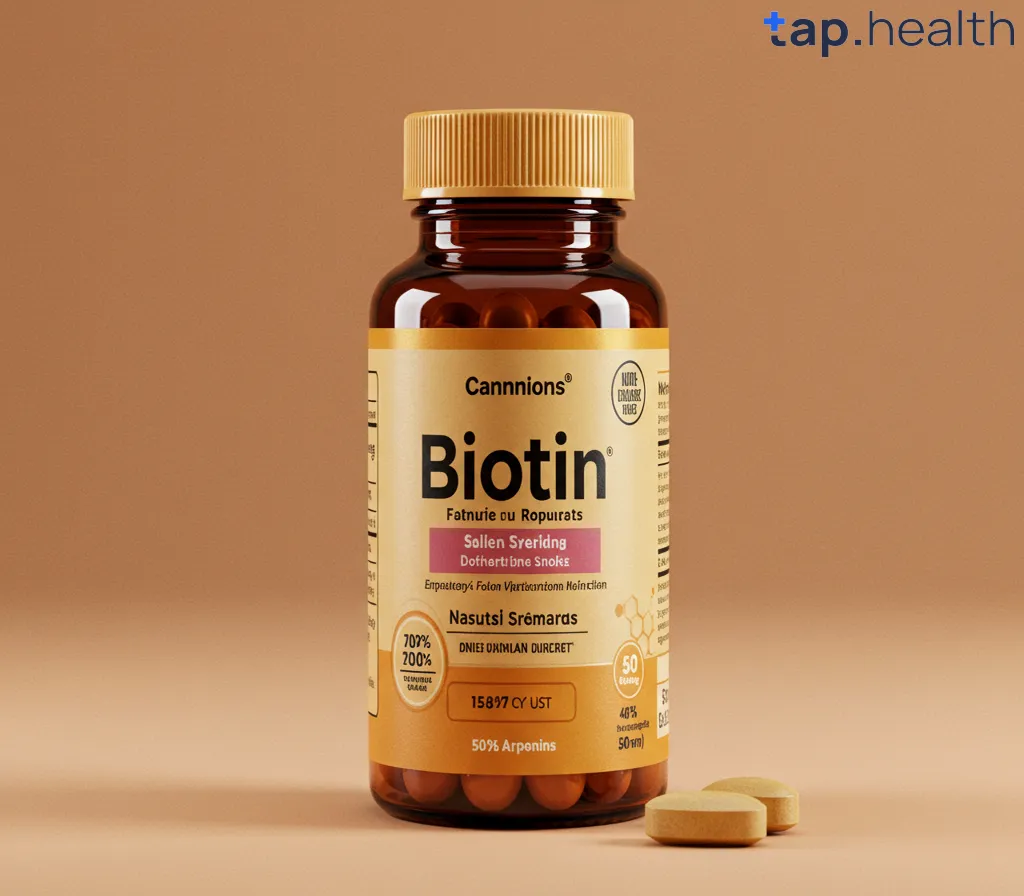You’ve been taking biotin every day for two weeks. You check your hair in the mirror. Your nails. Your skin.
Nothing seems different.
You ask yourself:
How long does it take for biotin vitamins to work?
You’re not alone. Millions of people take biotin hoping for stronger nails, thicker hair, and clearer skin. But results don’t happen overnight—and that’s normal.
Here’s the quick answer:
It usually takes 3 to 6 months of daily use to see noticeable changes from biotin supplements.
Why so long? Because biotin supports the growth of hair, skin, and nails—and those things grow slowly. You can’t rush biology.
In this article, we’ll break everything down in plain, easy-to-understand language—no confusing medical jargon, no robotic tone. Just honest, science-backed facts from trusted sources like the National Institutes of Health (NIH), Mayo Clinic, Cleveland Clinic, and Harvard Health.
We’ll cover:
- What biotin is and why your body needs it
- How it helps hair, skin, and nails
- The real timeline for seeing results
- Who benefits most (and who might not)
- Safe dosages and side effects
- How to take biotin properly
- And much more
Let’s get into it.
What Is Biotin and Why Do We Need It?
Biotin, also known as vitamin B7 or vitamin H, is a water-soluble vitamin that helps your body turn food into energy.
But most people take it for another reason: it supports healthy hair, skin, and nails.
Biotin plays a key role in:
- Making keratin—a protein that makes up your hair, skin, and nails
- Supporting cell growth
- Metabolizing fats, carbs, and proteins
Your body doesn’t make biotin on its own, but you usually get enough from food. Good sources include:
- Eggs (especially yolks)
- Nuts (like almonds and walnuts)
- Seeds (sunflower, chia)
- Sweet potatoes
- Spinach
- Whole grains
- Dairy products
Most people don’t need a supplement—unless they have a deficiency or specific health goals.
What Are the Benefits of Biotin Supplements?
People take biotin mainly for three reasons:
1. Stronger, Faster-Growing Nails
Weak, peeling, or brittle nails? Biotin may help.
Studies show that people with brittle nail syndrome who take biotin (2.5–5 mg daily) for 6 months often see:
- Thicker nails
- Less splitting
- Up to 25% improvement in nail strength
One study found that 91% of users reported firmer, harder nails after 6 months.
2. Healthier, Thicker Hair
Biotin is famous for helping hair grow. But here’s the truth:
It only works well if you’re low in biotin to begin with.
For people with biotin deficiency, supplementing can lead to:
- Reduced hair shedding
- Thicker strands
- Improved scalp health
But for those with normal levels, the results may be mild or hard to notice.
Still, many people report their hair feels stronger or shinier after a few months.
3. Clearer, Smoother Skin
Biotin helps maintain a healthy skin barrier and supports fat production, which keeps skin moisturized.
Low biotin levels can cause:
- Dry, scaly skin
- Rashes around the eyes, nose, or mouth
- Cracked corners of the lips
Supplementing can improve these issues—especially in people with a deficiency.
For general skin health, biotin works best when combined with other B vitamins and a good skincare routine.
How Long Does It Take for Biotin to Work?
This is the big question. So let’s break it down by what you’re trying to improve.
1. For Nails: 3–6 Months
Nails grow slowly—about 1–2 mm per week. So even if biotin starts working right away, you won’t see changes for weeks.
Most people notice:
- 1–2 months: Nails may feel less brittle
- 3–4 months: Visible thickness and strength
- 6 months: Best results—less breakage, smoother texture
A 2017 review in Skin Appendage Disorders found that biotin improved nail strength in 3–6 months for most users.
2. For Hair: 3–9 Months
Hair grows about half an inch per month. And it takes time for new, healthier hair to replace old strands.
Here’s a typical timeline:
- Month 1–2: No visible change (but biotin is working inside)
- Month 3: Less shedding, maybe a little more shine
- Month 4–6: Thicker hair, improved texture
- Month 6–9: Most noticeable results—fuller look, stronger roots
Note: If you have hair loss due to stress, hormones, or medical conditions (like thyroid issues), biotin alone may not be enough.
3. For Skin: 2–4 Months
Skin cells renew every 28–40 days, so changes can show up faster than with hair or nails.
You might notice:
- After 4–6 weeks: Skin feels smoother
- After 2 months: Fewer dry patches, less redness
- After 3–4 months: More even tone and hydration
But again, results depend on your starting point. If your skin is already healthy, changes may be subtle.
Why Does Biotin Take So Long to Work?
Because your body can’t speed up growth. Hair, skin, and nails renew slowly—no matter how many pills you take.
Think of biotin like fertilizer for a plant. You can’t make a seed grow faster just by adding more fertilizer. But with time and care, the plant becomes stronger and healthier.
Biotin supports the process of growth—it doesn’t force it.
Also:
- Biotin levels build up gradually in your body
- It takes time for new cells (with more keratin) to replace old ones
- Most people don’t have a deficiency, so results are slower
Patience is key.
Who Benefits Most from Biotin?
Not everyone will see big changes. Biotin works best for:
1. People with Biotin Deficiency
True biotin deficiency is rare, but it can happen due to:
- Genetic disorders
- Long-term antibiotic use
- Certain medications
- Excessive raw egg consumption (raw egg whites contain avidin, which blocks biotin absorption)
Symptoms include:
- Hair thinning or loss
- Brittle nails
- Skin rashes
- Fatigue
- Neurological issues
If you have a deficiency, biotin can bring dramatic improvements—sometimes within weeks.
2. People with Brittle Nails
Even without a full deficiency, some people have weak nails due to low biotin levels or poor diet.
Biotin is most proven for nail health—more than hair or skin.
3. Pregnant or Breastfeeding Women
Biotin needs go up during pregnancy. Some women become mildly deficient, which may affect hair and nails.
Supplementing can help—but always talk to your doctor first.
4. People with Certain Medical Conditions
- Diabetes: Some studies suggest biotin may help with blood sugar control and nerve pain
- Multiple sclerosis (MS): High-dose biotin is being studied for nerve repair (under medical supervision)
But these uses are different from beauty-focused supplementation.
What Is the Best Dosage of Biotin?
There’s no official daily requirement for biotin, but experts suggest:
| Adults | 30 mcg per day |
| Pregnant Women | 30 mcg |
| Breastfeeding Women | 35 mcg |
But most supplements contain 1,000–10,000 mcg (1–10 mg)—way more than you need.
Is that safe?
Yes—biotin is water-soluble, so extra amounts are flushed out in urine. No storage, no toxicity.
But higher isn’t always better.
Studies show that 5,000 mcg (5 mg) per day is enough for hair and nail support. More than that doesn’t speed up results.
Can You Take Too Much Biotin?
While biotin itself isn’t toxic, very high doses (over 10,000 mcg) can cause problems:
1. Lab Test Interference
This is the biggest risk.
High-dose biotin can falsely raise or lower results on common blood tests, including:
- Thyroid tests
- Heart enzyme tests (like troponin)
- Vitamin D levels
- Hormone panels
This could lead to a wrong diagnosis—like being told you’re having a heart attack when you’re not.
The FDA warns that even 5,000–10,000 mcg can interfere with tests.
Always tell your doctor if you’re taking biotin—especially before blood work.
2. Skin Breakouts
Some people report acne or rashes after starting high-dose biotin.
Why? Biotin uses the same transport system as vitamin B5 (pantothenic acid). Too much biotin may block B5, which is important for skin health.
Solution: Lower the dose or take a B-complex to balance nutrients.
3. Dependency Myth
No, your body won’t “get used to” biotin and stop growing hair without it. That’s a myth.
If you stop taking biotin, your hair and nails will return to their natural state—not fall out suddenly.
How Should You Take Biotin for Best Results?
To get the most out of your supplement:
1. Take It Daily
Biotin works best with consistent, daily use. Skipping days slows progress.
Set a reminder or take it with breakfast.
2. Take It with Water
Swallow the pill with a full glass of water. No special timing needed—morning or night is fine.
3. Don’t Expect Overnight Changes
Give it at least 3 months before judging results. Take photos every month to track progress.
4. Combine with a Healthy Diet
Biotin works better when you also eat:
- Protein (for keratin)
- Omega-3s (for scalp and skin)
- Other B vitamins
- Zinc and iron (for hair growth)
No supplement can fix a poor diet.
5. Be Cautious with Gummies
Biotin gummies are popular, but:
- They often contain less biotin than pills
- They have sugar (which can worsen acne)
- They may not be as well-regulated
Check the label and choose reputable brands.
Can Biotin Help with Hair Loss?
It can help—but only in certain cases.
Biotin is not a cure for common baldness (like male or female pattern hair loss). That’s usually caused by hormones or genetics.
But it can help with hair loss due to:
- Biotin deficiency
- Poor nutrition
- Stress-related shedding (telogen effluvium)
If you’re losing hair, see a doctor first. Biotin might be part of the solution—but not the whole one.
Does Biotin Work for Everyone?
No. Results vary based on:
1. Your Starting Point
- If your biotin levels are already normal, changes may be small
- If you’re deficient, results can be dramatic
2. Genetics
- Some people naturally have strong nails or thick hair
- Others may not respond as well to supplements
3. Overall Health
- Poor diet, stress, or illness can limit results
- Biotin works best when your body is otherwise healthy
4. Product Quality
- Not all supplements are equal
- Choose brands with third-party testing (look for NSF, USP, or ConsumerLab seals)
Are There Side Effects of Biotin?
Most people tolerate biotin well, but possible side effects include:
| Acne or breakouts | May block vitamin B5 absorption |
| Digestive upset | Rare, but possible with high doses |
| Urine odor or color | Harmless—extra biotin is flushed out |
| Lab test errors | Serious risk with high doses |
If you notice acne or skin issues, try lowering the dose to 2,500–5,000 mcg.
Can You Take Biotin with Other Vitamins?
Yes—and it’s often better to do so.
Biotin works best as part of a B-complex or multivitamin because:
- Other B vitamins support energy and cell growth
- They help balance biotin’s effects
- They prevent nutrient imbalances
Just avoid taking multiple high-dose B7 supplements at once.
How Do You Know If Biotin Is Working?
Look for these signs over time:
For Nails:
- Less chipping or peeling
- Nails grow longer without breaking
- Surface looks smoother
For Hair:
- Less hair in your brush or shower drain
- New baby hairs at the hairline
- Improved texture (less dry or brittle)
For Skin:
- Fewer dry patches
- Less flakiness
- More even tone
Take monthly photos under the same lighting to track changes. It’s easy to miss slow progress.
What Happens If You Stop Taking Biotin?
Your hair, skin, and nails will gradually return to their natural state.
For example:
- If your nails were weak before, they may become brittle again
- Hair may shed more if you were low in biotin
- Skin might feel drier
But there’s no sudden hair loss or health crash—just a return to baseline.
If you liked the results, you can keep taking it. If not, stopping is safe.
Final Thoughts: How Long Does It Take for Biotin Vitamins to Work?
Let’s recap:
- ✅ Biotin supports hair, skin, and nail health by helping make keratin
- ✅ It takes 3–6 months to see real results—sometimes up to 9 months
- ✅ Best results are seen in people with deficiency or brittle nails
- ✅ 5,000 mcg (5 mg) per day is enough for most people
- ❌ It won’t fix genetic hair loss or replace a healthy diet
- ⚠️ High doses can interfere with lab tests—tell your doctor if you take it
Biotin isn’t a magic pill. It’s a helper. And like all helpers, it works best with time, consistency, and realistic expectations.
Start today. Be patient. Take photos. And give your body the time it needs to grow stronger from the inside out.
Frequently Asked Questions (FAQ)
How long does it take for biotin vitamins to work?
Most people see results in 3–6 months. Nails improve first, followed by hair and skin.
Does biotin really work for hair growth?
It can help—especially if you’re low in biotin. But it won’t stop genetic baldness.
Can you see results in 2 weeks?
No. Biotin doesn’t work that fast. Changes take months because hair and nails grow slowly.
How much biotin should I take daily?
30 mcg is enough for basic needs. For hair and nails, 2,500–5,000 mcg (2.5–5 mg) is common and safe.
Can biotin cause acne?
Yes, some people get breakouts. This may be due to biotin blocking vitamin B5. Try lowering the dose.
Does biotin thicken hair?
It may improve thickness and strength over time, especially in people with thinning due to deficiency.
When should I take biotin?
Any time of day is fine. Take it with water and food to reduce stomach upset.
Can I take biotin with other vitamins?
Yes. It works well with B-complex, multivitamins, or collagen supplements.
Does biotin affect lab tests?
Yes. High doses can interfere with thyroid, heart, and hormone tests. Always tell your doctor.
Is 10,000 mcg of biotin too much?
It’s not toxic, but it increases the risk of lab test errors. 5,000 mcg is usually enough.
Can men take biotin?
Yes. Biotin works the same for men and women. It may help with beard thickness and nail strength.
Do biotin gummies work as well as pills?
They can, but they often contain less biotin and more sugar. Check the label and choose quality brands.
What happens if I miss a day of biotin?
No problem. Just take your next dose. Consistency matters more than perfection.
Can you take biotin while pregnant?
Yes, but talk to your doctor. Biotin needs go up during pregnancy, and deficiency can affect the baby.
Will my hair fall out if I stop biotin?
No. Your hair will return to its natural state, but there’s no sudden shedding.
Biotin can be a helpful tool for healthier hair, skin, and nails—but it’s not a quick fix. Give it time, take it consistently, and pair it with good nutrition. The results may be slow, but they’re real. And when you finally see that stronger nail or fuller hairline, you’ll know it was worth the wait.



